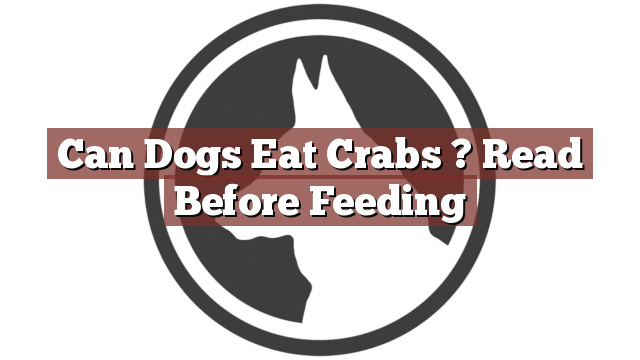Understanding Your Dog’s Dietary Needs
As a responsible pet owner, it’s crucial to understand your dog’s dietary needs to ensure their overall health and well-being. Dogs, just like humans, require a balanced diet that provides them with the necessary nutrients for optimal growth and development. While dogs primarily thrive on a diet of meat, it’s essential to introduce a variety of foods to provide a well-rounded nutritional profile. However, not all human foods are suitable for our furry friends, and it’s important to research before introducing new foods into their diet.
Can Dogs Eat Crabs? Read Before Feeding
Can dogs eat crabs? This is a common question that pet owners may ask when considering introducing seafood into their canine companion’s diet. The answer is yes, dogs can eat crabs in moderation. Crabs are a good source of protein, vitamins, and minerals which can be beneficial to your dog’s health. However, it’s important to follow certain guidelines to ensure the safety and well-being of your furry friend.
Crabs should be thoroughly cooked before feeding them to your dog. Raw or undercooked crabs can contain harmful bacteria or parasites that may cause digestive upset or even serious illness in dogs. Additionally, when feeding your dog crabs, it’s important to remove the shell completely to prevent any choking hazards or damage to their digestive system.
Pros and Cons of Feeding Crabs to Dogs
Feeding crabs to your dog can have both advantages and disadvantages. On the positive side, crabs provide a good source of protein, essential amino acids, and omega-3 fatty acids. These nutrients are important for your dog’s overall health, including promoting a healthy coat, supporting immune function, and aiding in muscle development. Crabs also contain vitamins such as vitamin B12, which plays a vital role in maintaining a healthy nervous system.
However, it’s important to consider some potential drawbacks as well. Crabs are high in sodium, which can be harmful to dogs if consumed in large quantities. Excessive sodium intake may lead to dehydration, increased blood pressure, or even sodium ion poisoning. Additionally, crabs may also contain certain allergens that could trigger food sensitivities or allergies in some dogs. It’s crucial to monitor your dog for any signs of allergic reactions when introducing new foods, including crabs, into their diet.
Conclusion: Considerations for Feeding Crabs to Dogs
In conclusion, dogs can eat crabs as an occasional treat, as long as certain precautions are taken. Always ensure that the crabs are thoroughly cooked and the shell is removed before feeding them to your dog. Keep in mind that moderation is key, as excessive consumption of crabs can lead to health issues due to their high sodium content. If your dog has any existing health conditions or a history of food sensitivities, it’s advisable to consult with your veterinarian before introducing crabs or any new food into their diet. By being informed and cautious, you can provide your furry friend with a safe and enjoyable dining experience.
Thank you for taking the time to read through our exploration of [page_title]. As every dog lover knows, our furry friends have unique dietary needs and responses, often varying from one canine to another. This is why it's paramount to approach any changes in their diet with caution and knowledge.
Before introducing any new treats or making alterations to your dog's diet based on our insights, it's crucial to consult with a veterinarian about [page_title]. Their expertise ensures that the choices you make are well-suited to your particular pet's health and well-being.
Even seemingly harmless foods can sometimes lead to allergic reactions or digestive issues, which is why monitoring your dog after introducing any new food item is essential.
The content provided here on [page_title] is crafted with care, thorough research, and a genuine love for dogs. Nevertheless, it serves as a general guideline and should not be considered a substitute for professional veterinary advice.
Always prioritize the expert insights of your veterinarian, and remember that the health and happiness of your furry companion come first.
May your journey with your pet continue to be filled with joy, love, and safe culinary adventures. Happy reading, and even happier snacking for your canine friend!

